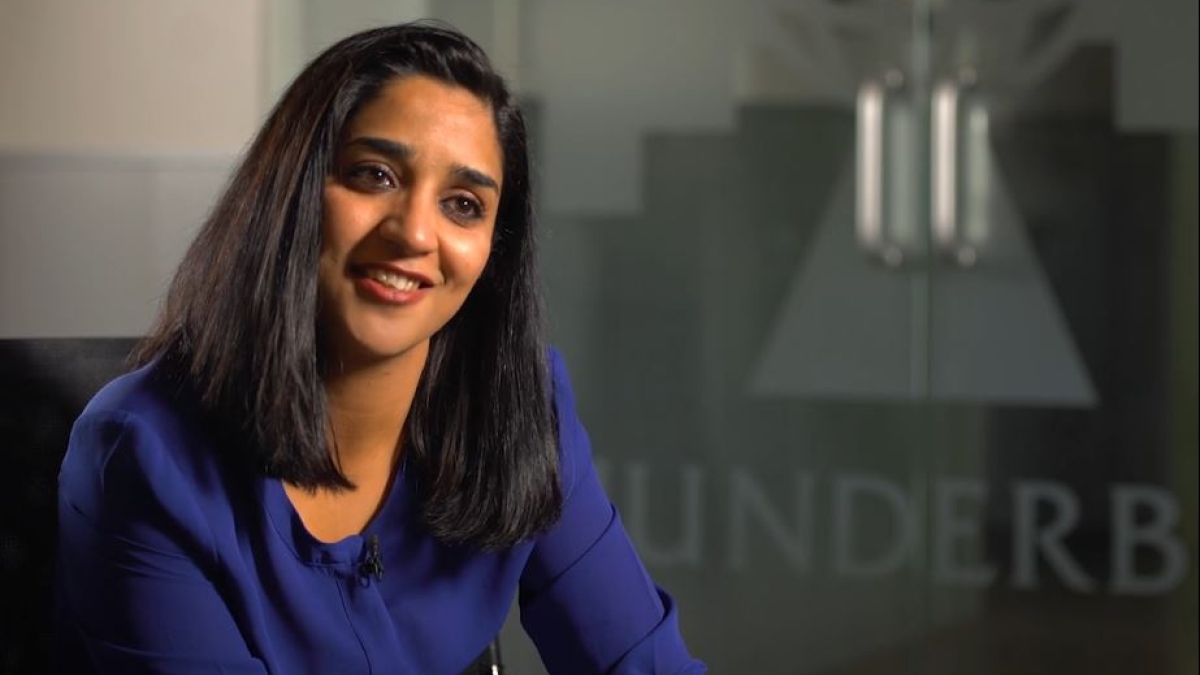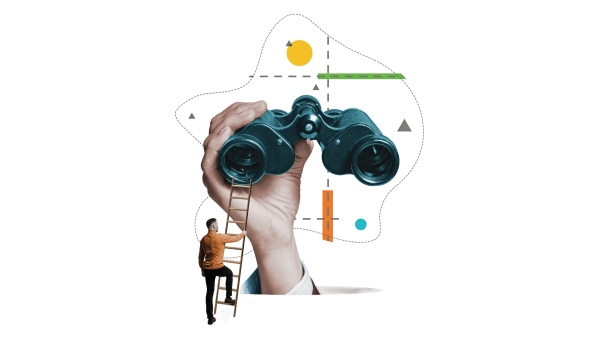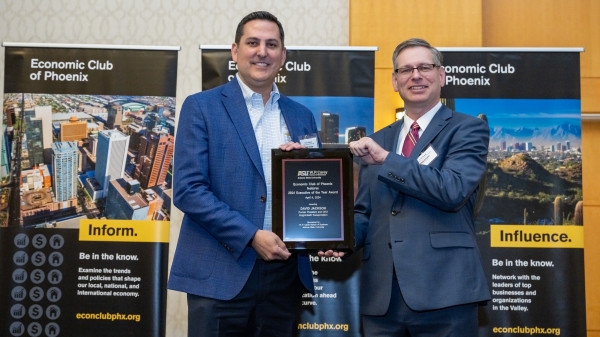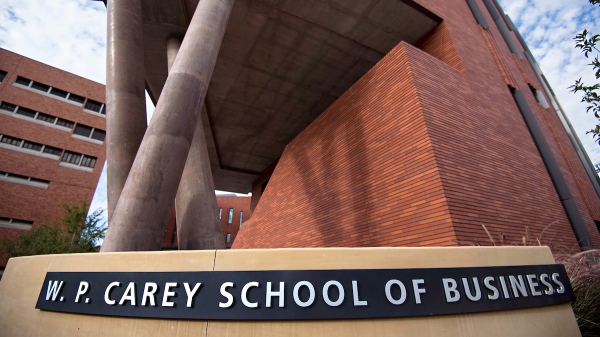Former refugee goes on journey of empowerment through education
ASU Thunderbird graduate's life changed on 9/11

Fatima Heravy '17, Afghanistan, Thunderbird Master of Arts in Global Affairs and Management.
This profile is part of a series highlighting the personal stories and achievements of Thunderbird students. Want to read more? Subscribe to the Knowledge Network newsletter.
When the twin towers fell on Sept. 11, 2001, millions of people watched in horror from living rooms, offices, airports or anywhere a TV could be found. Among those watching: a schoolgirl in Iran named Fatima Heravy. That day would change the course of her life.
Heravy's parents had fled Afghanistan amid the Soviet invasion and war that dragged on from 1979 to 1989 and led to the Taliban takeover in 1996. She was born and raised in Iran as a refugee, but that was never home.
“We always had a very strong attachment to Afghanistan,” said Heravy, who graduated this May with a Master of Arts in Global Affairs and Management from Thunderbird Global School of Management. “Being a refugee, you never have the peace of mind that you are in a safe situation. You always think, ‘This is not my home.’”
Her family dreamed of returning to Afghanistan. “It’s so funny because my parents would work so hard to buy things to take to Afghanistan,” she said. “‘We need this door, we need this window, we need this frame.’ That was the big activity, just thinking about what they needed for building a house in Afghanistan.”
‘Dream big, achieve big’
During her childhood in Iran, Heravy absorbed the values of her parents. “Living that hard life and seeing my parents working super hard to make better lives and a future for their four children — that has always pushed me forward, made me a stronger girl,” she says. “I wanted to be independent. I wanted to make a difference. I wanted to be someone who is useful.”
Despite their struggles, Heravy's parents promised she could achieve those goals.
“My parents taught us that education is the only thing that can put you at same level as others,” she explained. “So I always studied so hard that I was always among the top five in my class.”
Heravy gives much of the credit to her mother.
“My mom is my role model and probably the best leader I’ve ever known,” she said. “I remember once she told me years ago — and this is from someone who lived in an isolated area of Afghanistan, lived the refugee life and never went to school — ‘If you don’t dream big, you’re not going to achieve big.’”
Today, Heravy and her siblings are the family’s first generation to attain college degrees.
‘The Taliban were gone’
Even after the Soviet invasion had ended, Heravy's family remained discouraged by the situation in Afghanistan, especially when the Taliban came to power in the late 1990s.
“Every day, I would come home from school, and the first thing I did was watch the TV news to see what was happening in Afghanistan,” she said. “I didn’t live in Afghanistan during the Taliban, but I felt it.”
“There was no hope for going back,” she said. “Nothing was getting better; the Taliban were getting stronger every day.”
But 9/11 changed everything. “I remember I went home from school and I was just standing there watching TV, and I saw the twin towers — they went down. I said, ‘What’s happening?’”
In the turbulent days that followed, the United States set its military sights on Afghanistan to find and destroy al-Qaeda training hubs and hideouts. The U.S.-led coalition targeted the Taliban regime for harboring terrorists, and the regime collapsed.
“The Taliban were gone,” she said. “In just three months, everything had changed. There was hope for us to go back, finally.”
To be sure the country was safe and stable, Heravy's father decided the family should wait a few years before returning. Her brother returned first after being accepted into an engineering college (today, he is a civil engineer). And in 2006, the rest of her family finally packed up to leave Iran.
It was time to go home.
First taste of Thunderbird: Project Artemis
By 2008, Heravy was working with USAID in Afghanistan and had her first encounter with Thunderbird.
“I received a mass email about this project. It said, ‘If you have a business, if you are an entrepreneur, this is an educational program for Afghan businesswomen you can apply to.’”
It was Project Artemis, a Thunderbird initiative that trains Afghan women entrepreneurs in business skills. Since 2005, more than 75 women have graduated. They run successful businesses, creating more than 2,500 jobs and mentoring more than 15,000 fellow Afghans.
“I had no idea even how to start a business,” she said. “This program put that idea in my mind, so I applied.” She was not accepted but was encouraged to seek more experience.
“That pushed me toward leaving Afghanistan and going after an education,” she said. Heravy began applying for schools and scholarships in the United States. “I got the results and my letter said ‘Congratulations’ — I read it but I could not believe I got admission.”
“Education is the only power that you have.”
“My mom was so happy, but at the same time, I knew that inside she was sad,” Heravy remembered. The moment was bittersweet, but there was no question her parents would let her go to the United States. “My parents knew how valuable education is. Especially since my country was going through many decades of war. Education is the only power that you can have.”
‘My heart is happy’
In 2011, Heravy was on her way to the U.S. to pursue undergraduate studies in business administration. But she struggled to adjust during freshman year.
“I thought, ‘I can’t wait to finish these four years and go back home. It’s so hard to live here by myself.’”
She noticed a divide between international students and American students, and it bothered her. “We never felt included. No one ever tried to connect.”
“I had a couple of friends who were thinking of a PhD or master’s degree. And I was like, ‘Are you crazy? Go home.’ But by my sophomore year, I was thinking about a master’s degree. I don’t know how that happened,” she said with a laugh.
Aiming to combine international affairs and business, her online research led right to Thunderbird’s Master of Arts in Global Affairs and Management and the SHARE Fellowship, a Thunderbird alumni-funded program that provides full-tuition scholarships for high-potential students from emerging markets.
Heravy had come full circle. Thanks to Project Artemis, she already knew of Thunderbird as a positive force back home.
“I thought, ‘This is exactly what I want.’ I had no idea back in 2008 that one day I would be here studying for my master’s.”
“Now that I’m here, I know personally three Artemis graduates. I am proud of them, and they are proud of me. And they are all successful. It is a very good program. And I really appreciate that someone here in the U.S. does things for women in Afghanistan. It means a lot. My heart is happy. I’m thousands of miles away from home, and I can still do something for my country.”
During her degree studies, Heravy supported Project Artemis and other programs like it as a student worker in the Thunderbird for Good division.
‘Included and appreciated’
Heravy's experience at Thunderbird started off on a perfect note.
“I remember walking toward my room. A couple of guys and girls were making BBQ, and they were like, ‘Oh hi — come join us. And I did not know them, but they were so warm and welcoming that I felt, ‘I’m in heaven.’”
“I always feel included. I always feel appreciated,” Heravy said of Thunderbird. “Being from Afghanistan, a refugee, coming from a war-torn country, it’s not embarrassing here. This is not something I should be ashamed of.”
“There are no borders. We are all human beings.”
“Before, I was just different from others. But here, I’m actually appreciated for being different. Not only do I love the diversity of the students, I love the diversity of the staff and faculty. I’m so happy I have professors from France, India, Korea, Nigeria, U.S., Australia — it’s just awesome,” she said. “It’s not only the numbers that make it international, it’s the actual people — the life here.”
“I am learning here and seeing the world differently. Going back, I can transfer that knowledge, I can encourage my people to learn and see the world through a different lens. Thunderbird gave me that lens.”
Hopes and fears
Heravy would love to return to Afghanistan but worries about her country’s dangerous decline.
“When we went back in 2006, I was really hopeful that everything was getting better — we had a government, people were out and about, we had businesses and an economy. But it’s kind of slowed down, and now it’s getting worse.”
As she considers her family’s future, Heravy's voice cracks with emotion: “It’s scary, and I’m sad for my nephews and nieces there. My sister moved to Germany last year. This is hard,” she said. “And I’m here, and I don’t know when I’ll go back.”
At the very time her sister’s family was migrating, one of Heravy's classes was discussing the Syrian refugee crisis.
“It was super hard when my sister moved to Germany — she went through the refugee journey that you see in the media. It took them a month,” she said. “So I was going through that but just not sharing it in class.”
“It was so sad, but I am happy that my nephews can see the world now,” she said. “I’m happy they can play soccer with other children their age, that they can understand that there are oceans — they see things that they would never have seen inside Afghanistan.”
“There are many Afghans who have big dreams, but mostly we want just a peaceful life.”
“Back home, we always have tension, anxiety, war. We struggle between life and death. Nothing in between,” she said. “There are many who definitely have big dreams, but mostly we want just a peaceful life.”
“I have a big dream. I want to work for a president’s office. I’ve always wanted to be a policy adviser,” she said. “Maybe I’ll get to Parliament. I want to work for the government. I can do a lot more for my home country. Hopefully one day.”
As for her time at Thunderbird, Heravy made “the most out of these differences and the diversity.”
“Just being kind and open to other people and cultures," she said. "Because at the end, the whole world is like one thing. It’s our planet. There are no borders. We are all human beings.”
More Business and entrepreneurship

5 easy ways to improve your focus
Editor's note: This story originally appeared in the summer 2024 issue of ASU Thrive magazine. Do goldfish really have a longer…

Honoring homegrown leadership
When Phoenix native David Jackson was a finance student at Arizona State University’s West Valley campus, he gave separate…

Multiple ASU MBA programs rank among best in country
In the U.S. News & World Report's 2024 Best Business Rankings, the W. P. Carey School of Business at Arizona State University…